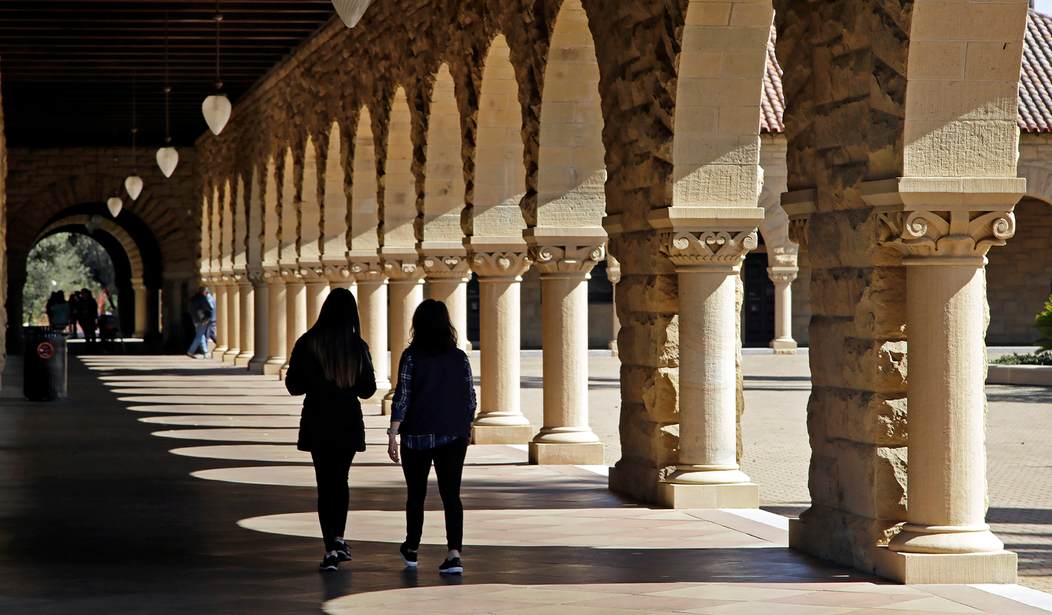A Stanford dean has been placed on administrative leave after she participated in interrupting a prominent guest speaker and lectured him on progressive gender ideology in front of the audience that came to see him.
Recently at Stanford University Law School, Kyle Duncan, a Trump-appointed federal judge, was fulfilling an invitation from the school’s Federalist Society when a group of student protesters interrupted his speech, shouting over him and refusing to let him continue. They claimed Duncan was transphobic and homophobic, based on past decisions in which he refused to grant transgender status to convicted male sex offenders.
Duncan was appointed by Donald Trump. And Duncan isn’t bowing to the demands of the pronoun police. In one case, he refused to bend a knee to the transgender mob. Norman Varner is a sex offender and a thug. He was convicted in a child pornography case in 2012, which followed a long history of sex offender offenses. Varner was sentenced to 15 years. At some point in his incarceration, Varner claimed he was a woman and his name was “Kathy Jett”. Varner wanted his court records to reflect that he was now a woman. Varner demanded that all court documents be changed to refer to him as Kathy Jett, not his dead name. “Jett” also demanded that his pronouns be “she/her”.
Duncan wasn’t having it. In a majority opinion, Duncan said the record was clear and would remain unchanged with “Norman Varner” as the convicted sex offender.
Duncan tried to appeal to the dean on site, Tirien Steinbach, to quell the protesters and allow him to continue his speech. Instead of aiding him, the Diversity, Equity and Inclusion dean lectured him for nearly ten minutes, accusing him of transphobia and saying he “literally denies the humanity of people.”
Stanford Law students shouted down Fifth Circuit appellate judge Kyle Duncan while he was trying to speak.
When he asked for an administrator to control the situation, Stanford’s “associate dean of diversity, equity, and inclusion” got up and lectured him for nearly 10 minutes pic.twitter.com/tjlUPOIMmQ
— Washington Free Beacon (@FreeBeacon) March 11, 2023
Stanford administrators apologized to Duncan for the disruption, and on Wednesday, Stanford Law Dean Jenny Martinez announced Steinbach had been place on administrative leave. In a ten-page letter, Martinez explained the importance of free speech on a law campus and reiterated that she would not be rescinding the original apology to Duncan.
As we consider the role of respectful treatment of members of our community, I want to be clear that the hate mail and appalling invective that have been directed at some of our students and law school administrators in the wake of March 9 are of great concern to me. All actionable threats that come to our attention will be investigated and addressed as the law permits. In the message below, I respond below to many of the questions I continue to receive about why I apologized to Judge Duncan, why I stand by that apology, and why the protest violated the university’s policy on disruption. I articulate how I believe our commitment to diversity and inclusion means that we must protect the expression of all views. And, I outline some of the steps the school will be taking in the wake of this incident, including the adoption of clearer protocols for managing disruptions and educational programming on free speech and norms of the legal profession.
She went on to explain that law school students in particular need to understand the importance of making an argument versus shouting down undesirable opinions or guests, adding it isn’t the school’s job to take “institutional positions” on current events.
At the same time, I want to set expectations clearly going forward: our commitment to diversity, equity, and inclusion is not going to take the form of having the school administration announce institutional positions on a wide range of current social and political issues, make frequent institutional statements about current news events, or exclude or condemn speakers who hold views on social and political issues with whom some or even many in our community disagree. I believe that focus on these types of actions as the hallmark of an “inclusive” environment can lead to creating and enforcing an institutional orthodoxy that is not only at odds with our core commitment to academic freedom, but also that would create an echo chamber that ill prepares students to go out into and act as effective advocates in a society that disagrees about many important issues. Some students might feel that some points should not be up for argument and therefore that they should not bear the responsibility of arguing them (or even hearing arguments about them), but however appealing that position might be in some other context, it is incompatible with the training that must be delivered in a law school. Law students are entering a profession in which their job is to make arguments on behalf of clients whose very lives may depend on their professional skill. Just as doctors in training must learn to face suffering and death and respond in their professional role, lawyers in training must learn to confront injustice or views they don’t agree with and respond as attorneys. Law is a mediating device for difference.
Martinez says the school will commit to educating deans and administrative staff further on their free speech and protest policies.
It was a rare moment of sanity in an increasingly insane higher education environment. However, it may have been based on a little more than free speech, although Martinez’ letter was quite clear about the school’s commitment to open dialogue.
Stanford is a prestigious school. One way a school keeps their status is by placing students in coveted internships and jobs post-graduation. For law students in particular, finding placements as clerks in judicial offices is an important start to a thriving law career. There have been rumors that some judges are beginning to pass over candidates coming out of hyper-progressive (woke) law programs, and in corporate America recruiters are looking at small things like the announcement of pronouns as clues to how cooperative and open to learning a young employee may be.
If Stanford wants to hold on to their status as a prestigious school of law, they have to be able to place their students in prime jobs. If their student body becomes known for being disruptive, uncooperative and rude, they will see a decline in the availability of those prime jobs.
Martinez is right to stand up for speech, but it is an equally intelligent move to work to preserve the integrity of Stanford graduates for future placements.
The opinions expressed by contributors are their own and do not necessarily represent the views of RedState.com.














Join the conversation as a VIP Member